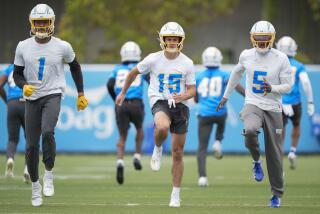Hometown of Voorhees Shattered by Betrayal : Drugs: Officials accuse former CS Northridge lineman of giving Just Say No speeches merely to obtain lighter sentence on cocaine conviction.
- Share via
His trading card used to be a collector’s item around his hometown of Redding, Calif. Now, few of those cards can be found in one piece.
The same Shasta County youngsters who once considered Barry Voorhees a hero have taken to shredding his cards.
Voorhees, a star offensive lineman in college and the World League of American Football, has betrayed the trust of a community.
At appearances during anti-drug abuse campaigns, Voorhees, a 6-foot-5, 300-pound former body builder, encouraged hometown crowds to “Just Say No”--never mentioning that he was free on bail awaiting appeal of his 1990 conviction for distributing cocaine.
“This guy took us good,” said Marv Steinberg, volunteer director of the Just Say No program in Shasta County. “We really got burned.”
Since the middle of last month, when Voorhees’ past as a San Fernando Valley-based drug trafficker was reported in a Times story, anti-drug abuse organizers have been occupied with damage control.
“He did more harm up here to kids than he ever did down there,” said Steinberg, adding that Voorhees approached him last spring with the idea of becoming a spokesman.
Just Say No organizers embraced Voorhees without reservation, Steinberg said, until Voorhees admitted during one anti-drug abuse crusade that he briefly had experimented with steroids while playing football for Cal State Northridge.
“I asked him if he ever used any other drugs, like cocaine,” Steinberg said. “He said his roommate did and he saw how it messed him up. That’s why he said he didn’t get involved with that stuff.”
According to court records, Voorhees sold cocaine, speed, the hallucinogenic drug Ecstasy, marijuana, human-growth hormone and steroids while attending Northridge, for which he was a first-team all-conference guard.
In interviews with detectives and his probation officer, Voorhees admitted to steroid use dating to 1986, when he decided to try out for the football team at Santa Barbara City College.
Voorhees has been subpoenaed to testify June 23 at the trial of Walter F. Jekot, a West Los Angeles physician who has been indicted on 27 counts of illegally distributing steroids. Jekot, 50, in a court declaration, accused Voorhees of exchanging promises of a homosexual relationship for steroids. Voorhees has denied there was a sexual relationship.
Detective Jeff Robinson said Voorhees volunteered about a year ago to join the Redding Police Department’s D.A.R.E. program but that his offer was declined because of D.A.R.E.’s policy of not using “recovering substance abusers” in its youth programs.
Robinson said Redding police had not known of Voorhees’ criminal record, only that Voorhees had admitted short-term use of steroids while at Northridge.
Still, Robinson found Voorhees to be an engaging spokesman for other organizations. “He talked about his friend who died strung out on cocaine and about losing his dad after years of alcohol abuse, all this stuff that touches your heart,” Robinson said.
Robinson said Voorhees vaguely referred to “minor substance abuse” in the past, “but nothing like carrying a gun and delivering cocaine.”
After D.A.R.E. refused Voorhees’ offer, Robinson said he spoke to Voorhees on only one other occasion.
He said Voorhees approached him in the police station parking lot, offering a trading card of himself intended for Robinson’s son, a fifth-grader, and asking the officer to write a letter of endorsement praising the volunteer work Voorhees had done in the anti-drug abuse campaign.
Robinson was told that the letter should be addressed to Voorhees. Curious, the officer asked why. “He said he needed 500 letters to set up his own anti-drug foundation,” Robinson said.
Robinson never wrote the letter.
“What I think he really wanted was to use the letter to influence the judge to give him a lighter sentence,” Robinson said.
Steinberg obliged after receiving a similar request. But he recently wrote Voorhees another letter, requesting that his endorsement be returned.
“I kick myself in the butt now,” said Steinberg, the superintendent of a one-school district in Bella Vista. “The reaction here has been anger, hostility and hurt that we’ve been used.”
Steinberg, frustrated in previous attempts to get a San Francisco 49er as a guest speaker at anti-drug abuse functions, said Voorhees is the last professional athlete who will represent the Shasta County Just Say No program.
“I’ve given up,” Steinberg said. “We’re going to use our own kids as examples to lead our programs. Forget the outside world.”
Voorhees has declined comment since the middle of last month, about the time the 2nd District Court denied his appeal. He plans to petition the state Supreme Court to hear an appeal of his conviction. Two weeks ago, he was released by the World League of American Football’s Barcelona Dragons, for whom he was a second-team all-league choice last season.
The Dragons say Voorhees requested his own release to seek employment with another of the league’s teams closer to home. Voorhees, through attorney Doug Hayes, denies that.
“He says he’s been blackballed in the WLAF because of (the story),” Hayes said.
However, the L.A. Wings of the Arena Football League already have offered Voorhees a tryout.
But even if he never again plays professional football, Voorhees will not soon be forgotten by at least one group of youngsters who once looked up to him.
Robinson says Voorhees was the subject of a paper his son wrote for a current-events assignment in school. “I’ve never seen my son use such strong language,” Robinson said. “He talked about how Voorhees lied and took advantage of people and how upset and misled people were.
“I think, to a lot of kids, it changed the way they look at professional athletes.”
More to Read
Sign up for Essential California
The most important California stories and recommendations in your inbox every morning.
You may occasionally receive promotional content from the Los Angeles Times.














